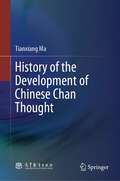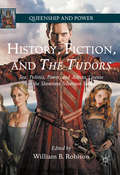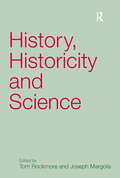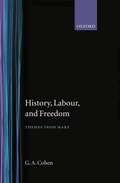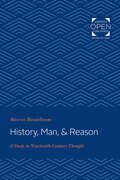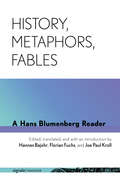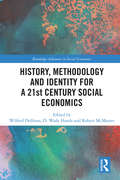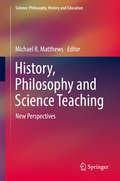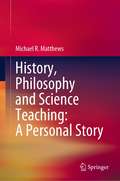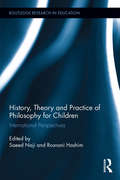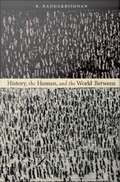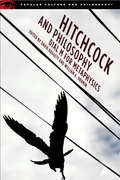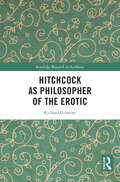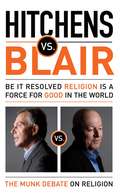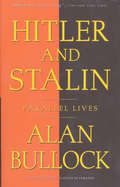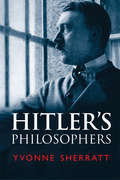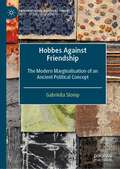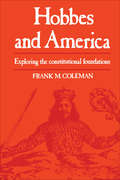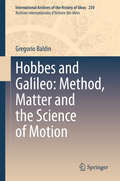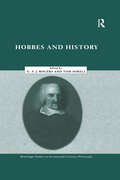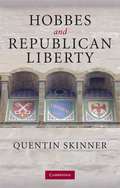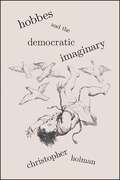- Table View
- List View
History of the Development of Chinese Chan Thought
by Tianxiang MaThe book aims to describe the history of Chan (Japanese Zen) School thought from the standpoint of social history. Chan, a school of East Asian Buddhism, was influential on all levels of societies in the region because of its intellectual and aesthetic appeal. In China, Chan infiltrated all levels of society, mainly because it engaged with society and formed the mainstream of Buddhism from the tenth or eleventh centuries through to the twentieth century. This book, taking a critical stance, examines the entire history of Chan thought and practice from the viewpoint of a modern Chinese scholar, not a practitioner, but an intellectual historian who places ideological developments in social contexts. The author suggests that core elements of Chan have their origins in Daoist philosophers, especially Zhuangzi, and not in Indian Buddhist concepts. Covering the period from the sixth century into the twentieth century, it deals with Chan interactions with neo-Confucianism, Quanzhen Daoism, and Gongyang new text philology, as well as with literature and scholarship, its fusion with Pure Land Buddhism, and its syncretic tendencies. Chan’s exchanges with emperors from the Song, Yuan, Ming, and Qing Dynasty, as well as the motives of some loyalists of the Ming Dynasty for joining Chan after the fall of the Ming, are described. The book concludes with an examination of the views of Chan of Hu Shi, D.T. Suzuki, and the scholar-monk Yinshun.
History, Fiction, and The Tudors: Sex, Politics, Power, and Artistic License in the Showtime Television Series (Queenship and Power)
by William B. RobisonThis is the first book-length study of the award-winning historical drama The Tudors. In this volume twenty distinguished scholars separate documented history, plausible invention, and outright fantasy in a lively series of scholarly, but accessible and engaging essays. The contributors explore topics including Henry VIII, Catherine of Aragon, Anne Boleyn, his other wives and family, gender and sex, kingship, the court, religion, and entertainments.
History, Geography and Civics
by John BuchananHistory, Geography and Civics provides an in-depth and engaging introduction to teaching and learning socio-environmental education from F-6 in Australia and New Zealand. It explores the centrality of socio-environmental issues to all aspects of life and education and makes explicit links between pedagogical theories and classroom activities. Part I introduces readers to teaching and learning history, geography and environmental studies, and civics and citizenship, as well as issues in intercultural and global education. Part II explores the use of media and sources, values and attitudes, assessment and creative teaching. Each chapter provides links to the Australian Curriculum, including cross-curriculum priorities: sustainability, Aboriginal and Torres Strait Islander education, and Asia and Australia's engagement with Asia. History, Geography and Civics encourages the reader to consider their own beliefs, values and attitudes in relation to their teaching and includes provocations and reflective questions to foster discussion and engagement.
History, Historicity and Science
by Joseph MargolisThis fresh collection of essays questions how the historical process affects our conception of science, including our understanding of its validity as well as our general conception of knowledge. The essays in this book consider the philosophical labours spanning the work of Descartes, Kant and Hegel, still the philosophical basis of our modern understanding of science, as well as recent selected philosophers and historians of science such as Kuhn and Feyerbend. Themes raised include the philosophical basis for the validity of science, the possibility of ever knowing the independent world as it truly is, and the intelligibility of construing scientific knowledge as a historical. Taken separately and together, these essays provide a sustained analysis of scientific claims to objective standing, the historicity of thought and inquiry. They point toward unfinished philosophical business and the need for a new beginning.
History, Labour, and Freedom: Themes From Marx
by G. A. CohenTaking Karl Marx's theory of history as their point of departure, these essays, extensively revised and rewritten for this volume, chronicle the growth of humanity's power to produce, and the suffering that the byproducts of this freedom--exploitation, lack of freedom, indignity--have caused. Cohen begins with a discussion and defense of historical materialism before expressing his own reservations about the theory, arguing that the truth of historical materialism is far more open than many Marxists believe. He then addresses some of the principal difficulties under which workers labor in contemporary capitalist class society, offering important new insights for all students of politics, political theory, and Marxism.
History, Man, and Reason: A Study in Nineteenth-Century Thought
by Maurice MandelbaumOriginally published in 1971. The purpose of this book is to draw attention to important aspects of thought in the nineteenth century. While its central concerns lie within the philosophic tradition, materials drawn from the social sciences and elsewhere provide important illustrations of the intellectual movements that the author attempts to trace. This book aims at examining philosophic modes of thought as well as sifting presuppositions held in common by a diverse group of thinkers whose antecedents and whose intentions often had little in common. After a preliminary tracing of the main strands of continuity within philosophy itself, the author concentrates on how, out of diverse and disparate sources, certain common beliefs and attitudes regarding history, man, and reason came to pervade a great deal of nineteenth-century thought. Geographically, this book focuses on English, French, and German thought. Mandelbaum believes that views regarding history and man and reason pose problems for philosophy, and he offers critical discussions of some of those problems at the conclusions of parts 2, 3, and 4.
History, Metaphors, Fables: A Hans Blumenberg Reader (signale|TRANSFER: German Thought in Translation)
by Hans BlumenbergHistory, Metaphors, and Fables collects the central writings by Hans Blumenberg and covers topics such as on the philosophy of language, metaphor theory, non-conceptuality, aesthetics, politics, and literary studies. This landmark volume demonstrates Blumenberg's intellectual breadth and gives an overview of his thematic and stylistic range over four decades. Blumenberg's early philosophy of technology becomes tangible, as does his critique of linguistic perfectibility and conceptual thought, his theory of history as successive concepts of reality", his anthropology, or his studies of literature. History, Metaphors, Fables allows readers to discover a master thinker whose role in the German intellectual post-war scene can hardly be overestimated.
History, Methodology and Identity for a 21st Century Social Economics
by Wilfred Dolfsma Robert McMaster D. Wade HandsThis book seeks to advance social economic analysis, economic methodology, and the history of economic thought in the context of twenty-first-century scholarship and socio-economic concerns. Bringing together carefully selected chapters by leading scholars it examines the central contributions that John Davis has made to various areas of scholarship. In recent decades, criticisms of mainstream economics have rekindled interest in a number of areas of scholarly inquiry that were frequently ignored by mainstream economic theory and practice during the second half of the twentieth century, including social economics, economic methodology and history of economic thought. This book contributes to a growing literature on the revival of these areas of scholarship and highlights the pivotal role that John Davis’s work has played in the ongoing revival. Together, the international panel of contributors show how Davis’s insights in complexity theory, identity, and stratification are key to understanding a reconfigured economic methodology. They also reveal that Davis’s willingness to draw from multiple academic disciplines gives us a platform for interrogating mainstream economics and provides the basis for a humane yet scientific alternative. This unique volume will be essential reading for advanced students and researchers across social economics, history of economic thought, economic methodology, political economy and philosophy of social science.
History, Philosophy and Science Teaching
by Michael R. MatthewsProduced by the Ontario Institute for Studies in Education, this inaugural volume in a new series contains 17 articles (most previously published) by historians, philosophers, psychologists, natural scientists, and science educators who advocate the teaching of science from a broader view in order to improve students' perception of the discipline, increase the development of critical skills, and retain a greater number of students in the field. Annotation copyrighted by Book News, Inc. , Portland, OR
History, Philosophy and Science Teaching: A Personal Story
by Michael R. MatthewsThis book is an historical narrative of academic appointments, significant personal and collaborative research endeavours, and important editorial and institutional engagements. For forty years Michael Matthews has been a prominent international researcher, author, editor and organiser in the field of ‘History, Philosophy and Science Teaching’. He has systematically brought his own discipline training in science, psychology, philosophy of education, and the history and philosophy of science, to bear upon theoretical, curricular and pedagogical issues in science education. The book includes accounts of philosophers who greatly influenced his own thinking and who also were personal friends – Wallis Suchting, Abner Shimony, Robert Cohen, Marx Wartofsky, Israel Scheffler, Michael Martin and Mario Bunge. It advocates the importance of clear writing and avoidance of faddism in both philosophy and in education. It concludes with a proposal for informed and enlightened science teacher education.
History, Theory and Practice of Philosophy for Children: International Perspectives (Routledge Research in Education)
by Saeed Naji Rosnani HashimThis book on Philosophy for Children (P4C) is a compilation of articles written by its founders and the movement‘s leaders worldwide. These articles have been prepared in the dialogue and interview format. Part I explains the genesis of the movement, its philosophical and theoretical foundations. Part II examines the specialized uses of philosophical dialogues in teaching philosophy, morality, ethics and sciences. Part III examines the theoretical concerns such as the aims of the method in regards to the search for truth or sense of meaning, or the debate on the novel or short stories and its characteristics. Part IV explains the practices of P4C worldwide and the issue of cultural differences, the ways of the community of inquiry and the necessary adaptation to suit local concerns. The book concludes with a notable review of the progress of P4C, the obstacles, and its international spread to over 60 countries. These penetrating insights make the book an incredibly rich resource for anyone interested in or involved with implementing a P4C programme. Brave Old Subject, Brave New World Teaching Science and Morality Via P4C Showing Children can do Philosophy
History, the Human, and the World Between
by R. RadhakrishnanHistory, the Human, and the World Between is a philosophical investigation of the human subject and its simultaneous implication in multiple and often contradictory ways of knowing. The eminent postcolonial theorist R. Radhakrishnan argues that human subjectivity is always constituted "between": between subjective and objective, temporality and historicity, being and knowing, the ethical and the political, nature and culture, the one and the many, identity and difference, experience and system. In this major study, he suggests that a reconstituted phenomenology has a crucial role to play in mediating between generic modes of knowledge production and an experiential return to life. Keenly appreciative of poststructuralist critiques of phenomenology, Radhakrishnan argues that there is still something profoundly vulnerable at stake in the practice of phenomenology. Radhakrishnan develops his rationale of the "between" through three linked essays where he locates the terms "world," "history," "human," and "subject" between phenomenology and poststructuralism, and in the process sets forth a nuanced reading of the politics of a gendered postcolonial humanism. Critically juxtaposing the works of thinkers such as Friedrich Nietzsche, Adrienne Rich, Frantz Fanon, Edward Said, Michel Foucault, Maurice Merleau-Ponty, Martin Heidegger, David Harvey, and Ranajit Guha, Radhakrishnan examines the relationship between systems of thought and their worldly situations. History, the Human, and the World Between is a powerful argument for a theoretical perspective that combines the existential urgency of phenomenology with the discursive rigor of poststructuralist practices.
Hitchcock and Philosophy
by David Baggett William A. DruminThe shower scene in Psycho; Cary Grant running for his life through a cornfield; "innocent" birds lined up on a fence waiting, watching - these seminal cinematic moments are as real to moviegoers as their own lives. But what makes them so? What deeper forces are at work in Hitchcock's films that so captivate his fans? This collection of articles in the series that's explored such pop-culture phenomena as Seinfeld and The Simpsons examines those forces with fresh eyes. These essays demonstrate a fascinating range of topics: Sabotage's lessons about the morality of terrorism and counter-terrorism; Rope's debatable Nietzschean underpinnings; Strangers on a Train's definition of morality. Some of the essays look at more overarching questions, such as why Hitchcock relies so heavily on the Freudian unconscious. In all, the book features 18 philosophers paying a special homage to the legendary auteur in a way that's accessible even to casual fans.
Hitchcock as Philosopher of the Erotic (Routledge Research in Aesthetics)
by Richard GilmoreThis book reads Alfred Hitchcock as a philosopher of what constitutes the erotic. The author argues that Hitchcock is doing a post-Nietzschean, postmodern kind of philosophy in which he is exploring and creating possibilities of what the erotic can feel like and how the erotic can be expressed.The erotic is a pervasive phenomenon in Hitchcock’s films. It involves irony, play, and sophistication, and there can be erotic failures as well as erotic successes. The erotic is most complexly explored by Hitchcock in his two masterpieces from the 1950s: Vertigo (1958), a story of the failure of the erotic, and North by Northwest (1959), in which the erotic is consummated in marriage. The author argues that Hitchcock has a philosophical theory about what makes the difference. It is a version of existential philosophy that understands what a person is to be based on what they make of themselves through their choices. The author argues that the erotic for Hitchcock is a process of mutual, reciprocal creation of the personality of the other person. This process is complicated by the fact that as one attempts to create the person one desires, one is simultaneously being created by that other person, and so what one desires is also in a process of being recreated in the mutual reciprocal dance of the erotic entanglement. There is a moral dimension to this because erotic failure is, in a way, a failure of the human, not in the sense of a human essence, but in the sense of realizing human possibilities that can make our lives more satisfying, complete, and full.Hitchcock as Philosopher of the Erotic will appeal to scholars and advanced students working on philosophy of film, film studies, and philosophy of love and sex.
Hitchens vs. Blair: Be It Resolved Religion Is a Force for Good in the World (The Munk Debates)
by Christopher Hitchens Tony BlairIntellectual juggernaut and staunch atheist Christopher Hitchens goes head-to-head with former British Prime Minister Tony Blair, one of the Western world’s most openly devout political leaders, on the highly charged topic of religion. Few world leaders have had a greater hand in shaping current events than Blair; few writers have been more outspoken and polarizing than Hitchens. In this edition of The Munk Debates -- Canada’s premier international debate series -- Hitchens and Blair square off on the contentious questions that continue to dog the topic of religion in our globalized world: How does faith influence our actions? What is the role of people of faith in the public sphere? Is religious doctrine rigid, or should we allow for flexibility in our interpretations? This exclusive debate, which played out to a sold-out audience, is now available in print form, along with candid interviews with Hitchens and Blair. Sharp, provocative, and thoroughly engrossing, Hitchens vs. Blair is a rigorous and electrifying intellectual sparring match on the oldest question: Is religion a force for good in the world?
Hitler and Stalin: Parallel Lives
by Alan BullockForty years after his Hitler: A Study in Tyranny set a standard for scholarship of the Nazi era, Lord Alan Bullock gives readers a breathtakingly accomplished dual biography that places Adolf Hitler's origins, personality, career, and legacy alongside those of Joseph Stalin--his implacable antagonist and moral mirror image.
Hitler's Philosophers
by Yvonne SherrattHitler had a dream to rule the world, not only with the gun but also with his mind. He saw himself as a "philosopher-leader" and astonishingly gained the support of many intellectuals of his time. In this compelling book, Yvonne Sherratt explores Hitler's relationship with philosophers and uncovers cruelty, ambition, violence, and betrayal where least expected--at the heart of Germany's ivory tower.Sherratt investigates international archives, discovering evidence back to the 1920s of Hitler's vulgarization of noble thinkers of the past, including Kant, Nietzsche, and Darwin. She reveals how philosophers of the 1930s eagerly collaborated to lend the Nazi regime a cloak of respectability: Martin Heidegger, Carl Schmitt, and a host of others. And while these eminent men sanctioned slaughter, Semitic thinkers like Walter Benjamin and opponents like Kurt Huber were hunted down or murdered. Many others, such as Theodor Adorno and Hannah Arendt, were forced to flee as refugees. The book portrays their fates, to be dispersed across the world as the historic edifice of Jewish-German culture was destroyed by Hitler.Sherratt not only confronts the past; she also tracks down chilling evidence of continuing Nazi sympathy in Western Universities today.
Hobbes Against Friendship: The Modern Marginalisation of an Ancient Political Concept (International Political Theory)
by Gabriella SlompThis book explores why and how Thomas Hobbes – the 17th century founder of political science -- contributed to the modern marginalisation of ‘friendship’, a concept that stood in the foreground of ancient moral and political thought and that is currently undergoing a revival. The study shows that Hobbes did not question the occurrence of friendship; rather, he rejected friendship as an explanatory and normative principle of peace and cooperation. Hobbes’s stance was influential because it captured the spirit of modernity- its individualism, nominalism, practical scepticism, and materialism. Hobbes’s legacy has a bearing on contemporary debates about civic, international and global friendship.
Hobbes Today
by S. A. LloydHobbes Today: Insights for the 21st Century brings together an impressive group of political philosophers, legal theorists, and political scientists to investigate the many ways in which the work of Thomas Hobbes, the famed seventeenth century English philosopher, can illuminate the political and social problems we face today. Its essays demonstrate the contemporary relevance of Hobbes's political thought on such issues as justice, human rights, public reason, international warfare, punishment, fiscal policy, and the design of positive law, among others. The volume's contributors include both Hobbes specialists and philosophers bringing their expertise to consideration of Hobbes's texts for the first time. This volume will stimulate renewed interest in Hobbes studies among a new generation of thinkers.
Hobbes and America: Exploring the Constitutional Foundations
by Frank ColemanThis path-breaking study seriously shakes the credibility of the prevalent interpretations of American government and politics. It exposes the real American constitutional morality, one embodied in a code adhered to by those in political life.Frank Coleman makes a persuasive case that the real roots of the American political system are in Hobbes, and not, as is usually thought, in Locke. He shows that a Hobbesian interpretation fits the transactional, bargaining, or conflict-management nature of American politics pointed out by all the empirical political scientists, although this viewpoint is incompatible with the leading philosophical interpretations of American constitutionalism.In so far as the American system and its rationale are Hobbesian, they are thereby incapable of resolving social conflicts and of pursuing any common good. The leading theories, particularly the reformist theories, are unable to absorb the teachings of empirical political science – and to such an extent that one can speak of a pattern of political schizophrenia prevailing in the political science profession.Coleman is no naive iconoclast: he has a thorough grasp and appreciation of the traditions of political theory from Aristotle to Oakeshott: he dissects his material meticulously, with coherence and integrity. His synthesis of empirical and philosophical studies of political life sharpens our perceptions and forces a re-evaluation of certain ideas and well-entrenched notions. Hobbes and America has serious implications for understanding both American politics and, more generally, western political experience and thought.
Hobbes and Galileo: Method, Matter and the Science of Motion (International Archives of the History of Ideas Archives internationales d'histoire des idées #230)
by Gregorio BaldinThis book, translated from Italian, discusses the influence of Galileo on Hobbes’ natural philosophy. In his De motu, loco et tempore or Anti-White (~ 1643), Thomas Hobbes describes Galileo as “the greatest philosopher of all times”, and in De Corpore (1655), the Italian scientist is presented as the one who “opened the door of all physics, that is, the nature of motion.” The book gives a detailed analysis of Galileo’s legacy in Hobbes’s philosophy, exploring four main issues: a comparison between Hobbes’ and Mersenne’s natural philosophies, the Galilean Principles of Hobbes’ philosophical system, a comparison between Galileo’s momentum and Hobbes’s conatus , and Hobbes’ and Galileo’s theories of matter. The book also analyses the role played by Marin Mersenne, in spreading Galileo’s ideas in France, and as a discussant of Hobbes. It highlights the many aspects of Hobbes’ relationship with Galileo: the methodological and epistemological elements, but also the conceptual and the lexical analogies in the field of physics, to arrive, finally, at a close comparison on the subject of the matter. From this analysis emerges a shared mechanical conception of the universe open and infinite, that replaces the Aristotelian cosmos, and which is populated by two elements only: matter and motion.
Hobbes and History (Routledge Studies in Seventeenth-Century Philosophy)
by Tom Sorell G. A. J. RogersMuch of Thomas Hobbes's work can be read as historical commentary, taking up questions in the philosophy of history and the rhetorical possibilities of written history. This collection of scholarly essays explores the relation of Hobbes's work to history as a branch of learning.
Hobbes and Republican Liberty
by Quentin SkinnerQuentin Skinner is one of the foremost historians in the world, and in Hobbes and Republican Liberty he offers a dazzling comparison of two rival theories about the nature of human liberty. The first originated in classical antiquity, and lay at the heart of the Roman republican tradition of public life. Thomas Hobbes was the most formidable enemy of this pattern of thought, and his successive attempts to discredit it constitute a truly epochal moment in the history of Anglophone political thought. Hobbes and Republican Liberty develops several of the themes announced by Quentin Skinner in his celebrated inaugural lecture on Liberty before Liberalism of 1997. Cogent, engaged, accessible, and indeed exhilarating, this new book will appeal to readers of history, politics, and philosophy at all levels from upper-undergraduate upwards, and provides an excellent introduction to the work of one of the most celebrated thinkers of our time.
Hobbes and the Artifice of Eternity
by Christopher Scott McclureThomas Hobbes argues that the fear of violent death is the most reliable passion on which to found political society. His role in shaping the contemporary view of religion and honor in the West is pivotal, yet his ideas are famously riddled with contradictions. In this breakthrough study, McClure finds evidence that Hobbes' apparent inconsistencies are intentional, part of a sophisticated rhetorical strategy meant to make man more afraid of death than he naturally is. Hobbes subtly undermined two of the most powerful manifestations of man's desire for immortality: the religious belief in an afterlife and the secular desire for eternal fame through honor. McClure argues that Hobbes purposefully stirred up controversy, provoking his adversaries into attacking him and unwittingly spreading his message. This study will appeal to scholars of Hobbes, political theorists, historians of early modern political thought and anyone interested in the genesis of modern Western attitudes toward mortality.
Hobbes and the Democratic Imaginary: Hobbes And The Democratic Imaginary
by Christopher HolmanAt a time when nearly all political actors and observers—despite the nature of their normative commitments—morally appeal to the language of democracy, the particular signification of the term has become obscured. Hobbes and the Democratic Imaginary argues that critical engagement with various elements of the work of Hobbes, a notorious critic of democracy, can deepen our understanding of the problems, stakes, and ethics of democratic life. Firstly, Hobbes's descriptive anatomy of democratic sovereignty reveals what is essential to the institution of this form of government, in the face of the conceptual confusion that characterizes the contemporary deployment of democratic terminology. Secondly, Hobbes's critique of the mechanics of democracy points toward certain fundamental political risks that are internal to its mode of operation. And thirdly, contrary to Hobbes's own intentions, Christopher Holman shows how the selective redeployment of certain Hobbesian categories could help construct a normative ground in which democracy is the ethical choice in relation to other sovereign forms.
